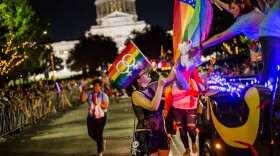Fifty-three percent of nearly 2,000 people surveyed by a City of Austin consultant said they had been verbally abused or harassed because of their sexual orientation or gender identity. According to a new 161-page report on Austin’s lesbian, gay, bisexual, transgender and queer community, that abuse most commonly came from strangers.
The LGBTQIA+ Quality of Life Study, which was funded by the city and completed by research firm Health Management Associates, attempted to identify how members of the community experience things like housing, health care and policing in Austin.

“We can’t talk about gentrification unless we’re talking about queer issues,” City Council Member Greg Casar said at a meeting Tuesday during which the survey results were presented. “We can’t talk about police reform unless we’re talking about those issues.”
The city began looking into a survey like this in earnest in 2017, the same year the Austin City Council created the LGBTQ Quality of Life Advisory Commission.
“We didn’t have any demographic data about the LGBTQ community in Austin,” Victor Martinez, one of the commissioners, told KUT. “We didn’t know how many of us there were, where do we live, what our needs are.”
Martinez said many of what surveyors found did not surprise him. For example, 41% of respondents said they felt uncomfortable asking police for help.

Others interviewed in focus groups said they left Austin to find doctors who were more educated about their needs.
“We heard that people were going to Houston for health care,” Charles Robbins, a principal with the firm that did the survey, told council members.
According to the Williams Institute, a research center out of the UCLA Law Center, nearly 6% of the Austin-area population identify as LGBT, ranking Austin behind San Francisco and Portland in a list of cities with the largest portion of LGBT residents. On Monday, Austin’s Transportation Department painted a rainbow-colored crosswalk downtown for National Coming Out Day.
Yet, Austin does not have a LGBTQ community center, something those who participated in focus groups said they’d really like to see built.
Ryn Gonzales, who chairs the city commission, said they have been a part of numerous conversations about a community center in Austin. But these talks often stall, they said, because no one can settle on where to put a center.
“Unlike other cities, Austin doesn’t have what would be colloquially called a gayborhood, which is typically where a community center pops up,” Gonzales said.










